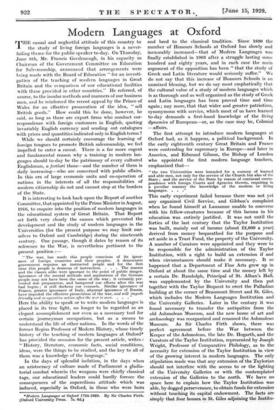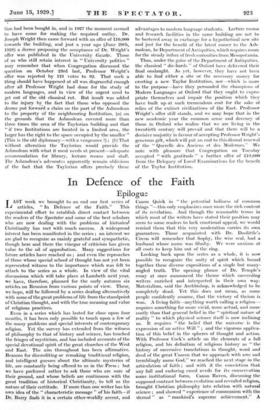Modern Languages at Oxford T HE casual and neglectful attitude of
this country to the study of living foreign languages is a never- failing theme for the public speaker to-day. On Thursday, June 6th, Mr. Francis Goodenough, in his capacity as Chairman of the Government Committee on Education for Salesmanship, announced that arrangements were being made with the Board of Education " for an investi- gation of the teaching of modern languages in Great Britain and the comparison of our educational facilities with those provided in other countries." He referred, of course, to the insular methods and manners of our business men, and he reinforced the recent appeal by the Prince of Wales for an effective prosecution of the idea, " sell British goods." How could this be done, however, he said, as long as there are export firms who conduct cor- respondence with foreign customers in English, quoting invariably English currency and sending out catalogues with prices and quantities indicated only in English terms ?
While we should certainly encourage the learning of foreign tongues to promote British salesmanship, we feel impelled to enter a caveat. There is a far more cogent and fundamental reason why a training in modern lan- guages should to-day be the patrimony of every cultured Englishman, a fortiori those—and the number of them is daily increasing—who are concerned with public affairs. In this era of large economic units and co-operation of nations in the interests of - all the responsibilities of modem citizenship do not and cannot stop at the borders of the State.
It is interesting to look back upon the Report of another Committee, that appointed by the Prime Minister in August, 1916, to enquire into the position of modem languages in the educational system of Great Britain. That Report set forth very clearly the causes which prevented the development and the study of modern languages in the Universities (for the present purpose we may limit our- selves to Oxford and Cambridge) during the nineteenth century. One passage, though it dates by reason of its reference to the War, is nevertheless pertinent to the present position :- " The war, has made this people conscious of its ignor- ance of foreign countries and their peoples. A democratic government requires an instructed people and for the first time this people is desirous of instruction. . . . The masses and the classes alike were ignorant to the point of public danger. Ignorance of the mental attitude and aspirations of the German people may not have been the cause of the war ; it certainly pre- vented due preparation, and hampered our efforts after the war had begun ; it still darkens our counsels. Similar ignorance of France, greater ignorance of Italy, abysmal ignorance of Russia, have impeded the effective prosecution of the war, and will impede friendly and co-operative action after the wir is over. . . ."
Here the ability to speak or to write modern languages is placed in its true light, no longer to be regarded as an elegant accomplishment nor even as a necessary tool for certain journeyman occupations, but as a means to understand the life of other nations. In the words of the former Regius Professor of Modem History, whose timely history of the teaching of modem languages at Oxford* has provided the occasion for the present article, writes : " History, literature, economic facts, social conditions, ideas, were the things to be studied, and the key to all of them was a knowledge of the language."
In the days of splendid isolation, in the days when an aristocracy of culture made of Parliament a gladia- torial combat wherein the weapons were chiefly classical tags, our educational leaders could hardly foresee the consequences of the supercilious attitude which was induced, especially in Oxford, in those who were born *Modern Languages at Oxford 1724-1929. By Sir Charles Firth. (Oxford University Press. 78. fid.) and bred to the classical tradition. Since 1890 the number of Honours Schools at Oxford has slowly and inexorably increased—that of Modern Languages was finally established in 1905 after a struggle lasting some hundred and eighty years, and in each case the main argument of the opposition has been " that the study of Greek and Latin literature would seriously suffer." We do not say that this increase of Honours Schools is an unmixed blessing, but we do say most emphatically that the cultural value of a study of modern languages which is as thorough and as well organized as the study of Greek and Latin languages has been proved time and time again; nay more, that that wider and greater patriotism, synonymous with service, which most of us have learned to-day demands a first-hand knowledge of the living dynamics of European—or, as the case may be, Colonial —affairs.
The first attempt to introduce modem languages at Oxford had, as it happens, a political background. In the early eighteenth century Great Britain and France were contending for supremacy in Europe—and later in America, and Edmund Gibson, the Bishop of London who appointed the first modem language teachers, emphasized that- " the two Universities were intended for a nursery of learned and able men, not only for the service of the Church but also of the State ; and the service of the State by reason of continual corres- pondence with foreign Courts and Agencies therein, requiring in a peculiar manner the knowledge of the modern or living languages. . . ."
This early experiment failed because there was not yet any organized Civil Service, and Gibbon's complaint when he found himself at Lausanne unable to converse with his fellow-creatures because of this lacuna in his education was entirely justified. It was not until the forties of the last century that the Taylor Institution was built, mainly out of income (about £2,600 a year) derived from money bequeathed for the purpose and set aside in a Trust Fund, the property of the University. A number of Curators were appointed and they were to be responsible for the administration of the Taylor Institution, with a right to build an extension if and when circumstances should make it necessary. It so happened that a Department of Fine Arts grew up in Oxford at about the same time and the money left by a certain Dr. Randolph, Principal of St. Alban's Hall, was supplemented by the University and then put together with the Taylor Bequest to erect the Palladian building at the corner of Beaumont Street and St. Giles, which includes the Modem Languages Institution and the University Galleries. Later in the century it was found necessary to transfer the antiquities from the old Ashmolean Museum, and the new home of art and archaeology was reorganized and renamed the Ashmolean Museum. As Sir Charles Firth shows, there was perfect agreement before the War between the Keeper of the Ashmolean, the late Dr. Hogarth, and the Curators of the Taylor Institution, represented by Joseph Wright, Professor of Comparative Philology, as to the necessity for extension of the Taylor Institution in view of the growing interest in modern languages. The only stipulation made was that any extension of the Taylorian should not interfere with the access to or the lighting of the University Galleries or with the contemplated extension of the Galleries to the north. We have no space here to explain how the Taylor Institution was able, by dogged perseverance, to obtain funds for extension without touching its capital endowment. The facts are simply that four houses in St. Giles adjoining the Institu- Lion had been bought in, and in 1927 the moment seemed to have come for making the, required outlay. Dr. Joseph Wright then came forward with an offer of £10,000 towards the building, and just a year ago (June 20th, 1928) a decree proposing the acceptance of Dr. Wright's offer was published in the University Gazelle. Those of us who still retain interest in " Uniyersity politics " may remember that when Congregation discussed the question on October 23rd last, Professor Weight's offer was rejected by 121 votes to 92. That such a thing should have happened at all was disgraceful enough after all Professor Wright had done for the study of modern languages, and in view of the urgent need to get out of the old classical rut. But insult was added to the injury by the fact that those who opposed the decree put forward a claim on the part of the Ashmolean to the property of the neighbouring Institution, (a) on the grounds that the Ashmolean covered more than three times the area of the Taylorian building and that " if two Institutions are located in a limited area, the larger has the right to the space occupied by the smaller " (This is the old diplomacy—with a vengeance !) ; (b) That without alteration the Taylorian would provide the Ashmolean with what it most needs at present—adequate accommodation for library, lecture rooms and staff. The Ashmolean's advocates apparently remain oblivious of the fact that the Taylorian offers precisely these advantages to modern language students. Lecture rooms and research facilities in the same building are not to be bartered away in exchange for a hypothetical new site and just for the benefit of the latest comer to the Ash- molean, he Department of Antiquities, which requires room for the steady influx of fresh curiosities from Mesopotamia.
Thus, under the guise of the Department of Antiquities, the classical " die-hards " of Oxford have delivered their final onslaught. As yet, however, they have not been able to find either a site or the necessary money for erecting a new Taylor Institution, nor—which is more to the purpose—have they persuaded the champions of Modern Languages at Oxford that they ought to expro- priate themselves and impair the position which they have built up at such tremendous cost for the sake of relics of the extinct civilizations of the East. Professor Wright's offer still stands, and we may hope that in the new academic year the common sense and decency of those in Oxford who realize that we are living in the twentieth century will prevail and that there will be a decisive majority in favour of accepting Professor Wright's generous gift, which will put an end to this dismal renewal of the " Querelle des Anciens et des Moderns.". We note with pleasure that Congregation on Tuesday accepted " with gratitude " a further offer of £10,000 from the Delegacy of Local Examinations for the benefit of the Taylor Institution. -







































 Previous page
Previous page